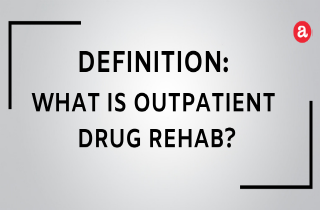Outpatient addiction rehab is a non-residential, therapy-based type of treatment for drug addiction. Here, we’ll review the main types of therapies found in most outpatient programs. Then, we invite your questions or comments about drug rehab at the bottom.
Outpatient drug rehab definition
Outpatient drug rehab is a therapy-based type of addiction treatment that DOES NOT include on-site living/housing arrangements. Outpatient facilities provide general rehab services, such as psychological and behavioral treatment, in a clinical setting. These programs give you the freedom to remain in a job or with your family while seeking treatment for drug addiction.
Who should attend outpatient rehab? People who are able to This type of rehab requires a certain level of participation per day or week in group/individual activities, but does not require that you remain at a facility full time. Most outpatient rehabs recommend 6-9 hours per week, while more intensive programs include 9+ hours of therapy.
Outpatient drug rehab goals
There are several goals of outpatient drug rehab. Of these goals, the most important is recovery from drug abuse. During drug rehab you will learn how to cope with life and how to get through difficulties without using drugs. In addition to drug-free living, harm reduction may also be encouraged. Here is a complete list of potential outpatient drug rehab goals:
- achieve abstinence
- address a wide range of psychosocial problems
- decrease antisocial behavior (criminal activity)
- decrease drug use (harm reduction)
- establish positive support system
- improve general health
- improve personal circumstances
- increase socially productive behavior (employment or school attendance)
- meet employment and educational needs
- resolve legal problems
- treat psychiatric disorders and psychological problems
What happens during outpatient drug rehab?
1. Screening and intake
During screening, rehab staff use diagnostic criteria to determine whether your drug use constitutes abuse. If you are found ineligible or inappropriate for outpatient drug rehab, staff will suggest an alternative program. Important factors for screening for drug abuse include:
- the nature of the substance abuse
- your physical condition
- your psychological function
- outside support/resources
- previous treatment efforts
- personal motivation
When you are found to be eligible for outpatient drug rehab, you will be asked to complete various forms. Typically, you fill out an admission or intake sheet, complete appropriate releases of information, submit financial data, sign a consent for treatment, and are assigned your primary counselor during this phase of treatment.
2. Orientation
During orientation, staff of the outpatient rehab center will describe to you the general nature and goals of the program, rules governing conduct and infractions that can lead to disciplinary action or discharge from the program, the hours during which services are available, treatment costs, and client rights.
3. Assessment
Next, an outpatient drug rehab should take you through the process of intake and assessment. The goal of assessment is to identify and evaluate your individual strengths, weaknesses, problems, and needs for the development of a drug addiction treatment plan. During this process the facility staff will assess your current condition, define the nature of drug abuse or addiction and determine a specific treatment plan for you as an individual.
4. Drug testing
Typically, when entering an outpatient facility you will be drug tested as a formality. Drug testing happens in order to keep everyone at the clinic safe.
5. The facilitation of treatment modalities
Groups form the crux of most outpatient drug rehab programs. In fact, group counseling and therapies are at the core of outpatient drug treatment. Core services provided by outpatient drug rehabs may include:
- 24-hour crisis coverage
- Case management
- Community-based support groups
- Family involvement and counseling
- Individual counseling
- Monitoring drug use
- Psycho-educational programming
- Vocational training and employment services
Groups are favored during outpatient drug rehab because they provide opportunities for clients to develop communication skills and participate in socialization experiences. These kinds of interactions are particularly useful for individuals whose socializing has revolved around using drugs.
Establishing an environment in which clients help, support, and, when necessary, confront one another, is also important. Groups also provide norms that reinforce healthful ways of interacting and a safe and supportive.
6. Supportive services and aftercare
This is usually the final step of outpatient drug rehab, and it aims to empower a patient to seek services outside of rehab in order to maintain abstinence and begin to create a support network. Outpatient staff can also help connect clients to the following services, which may or may not be delivered via the rehab facility:
- Adjunctive therapies
- Adult education
- Housing and food
- Licensed child care
- Nicotine cessation treatment
- Parent skills training
- Recreational activities
- Transportation services
What happens after outpatient drug rehab?
After your treatment at a outpatient drug rehab comes to a close, you will be encouraged to continue to seek services on your own. Structured relapse prevention, addiction counseling, and 12-Step facilitation are encouraged. These can include Narcotics Anonymous and Alcoholics Anonymous meetings, SMART Recovery groups, or other community or religious groups. The idea is to build a group of positive supporters who you can turn to in times of need. This will help you achieve long-term sobriety and will act as a prevention of future relapse.
Outpatient rehab for drug problems
Do you still have questions about outpatient programs? If you’d like to learn more about the duration of outpatient rehab programs, we welcome you to explore the link. If you have other inquiries, please leave us your questions in the comments section. We do our best to respond to all legitimate questions personally and promptly.









Related Posts